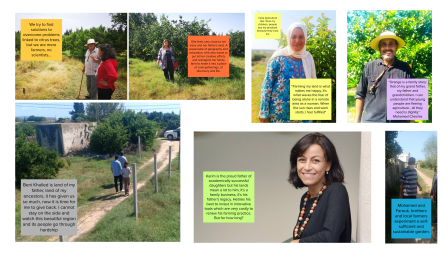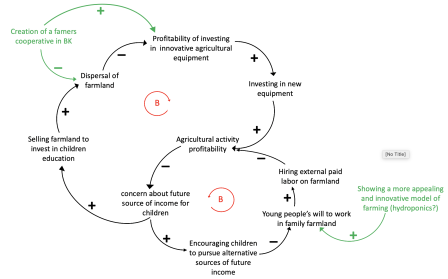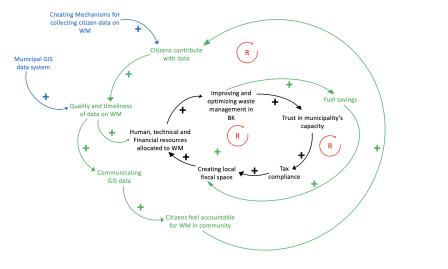Written by : Nadia Ben Ammar
GIS and citizen data for change: the case of waste management in Beni Khalled
June 21, 2022

In the context of its ‘Waste Management’ learning cycle, the Accelerator Lab in Tunisia has focused on the region of Beni Khalled, a rural community which is renowned for the production of citrus fruits. The initial data on Beni Khalled indicated issues revolving around agricultural waste management, agricultural production surplus, value of agricultural derived products, rural entrepreneurship and, value chain. Our learning journey is characterized by genuine curiosity and has been guided by the insights which emerge along the way. In Beni Khalled, we started our learning journey with no pre-established assumptions, just a handful of challenges. By being open and attentive to emerging collective intelligence, our path led us to a range of issues and challenges, many of which we did not expect as we started. In this blog, we hope to walk you through our discovery journey, share the hypotheses which were formulated and outline the design of our GIS experimentation, what we hope to achieve, as well as our learning approach and tools.
When we interviewed stakeholders in Beni Khalled on problems linked to waste management in their community, we uncovered some interesting and inspiring narratives from various sources, some of them are outlined in Figure 1.
A process of clustering and synthesizing the insights gathered led us to consider a variety of smaller and larger challenges which include:
- Agricultural production sustainability and profitability
- Dispersal of Farmland
- Waste management capacity
- Waste management accountability
- Trust deficit due to the lack of information on waste management
- Proximity of Wholesale market to Beni Khalled farmlands (or lack thereof)
- Lack of control from the Municipality on their own waste management system
- Costs and the fund-gap of waste management at municipal level
- Attractivity of Rural territories to young people from Beni Khalled
- Change in Family structures
- Women entrepreneurship
- Reinvention of rural identity and rural territories through time

Fig 1. Exploring Waste Management in Beni Khalled
In an effort to further unveil patterns in our data, a collective reflection was led with representatives from the Beni Khalled community. The idea, primarily, was to spot initial feedback loops to identify more focused exploration paths before formulating hypotheses for experimentation. In the next section we present the main feedback loops explored. We will then focus on the shared model we derived our main hypothesis from.
Emergent shared models in Beni Khalled
With our local stakeholders in Beni Khalled, we built several shared models and identified a number of system entry points to create positive change.
Green female Entrepreneurship, the fab lab culture and economic value
In Beni Khalled, there is a strong tradition of making home-based products derived from citrus fruits by women. This expertise is passed on from one generation to another allowing the preservation of the know-how among women in the community. Whether it is jam, lemonade or orange shortbread, these products increase the consumption of citrus products and thus decrease agricultural waste (see figure 2). Negative attitudes towards women selling these products (WHY are they negative attitudes? This is not clear) were identified as a major barrier for this practice to spread. The hypothesis was that creating conventions between neighboring hotels and restaurants in the touristic areas of the Nabeul region and thus increase profitability of derived products would result in less negative attitudes towards female entrepreneurial activities. A second hypothesis linked to entrepreneurial culture was developed: If we create a space for female entrepreneurship to thrive, more women would be attracted to create such derived products.

Figure 2: reducing waste through green female entrepreneurship
Family structure, youth, innovation and agricultural profitability
Existing data on Beni Khalled indicates that more than 70% of the farmlands have a size of 2 hectares (20000 sm) or less. This is mainly due, according to local actors, to the dispersal of farmland following inheritance or simply because many families sell their land to invest in their children’s education. Figure 3 presents 2 competing balancing loops which both lead to a decrease in agricultural profitability, which remains a major driver in sustaining agricultural activity in the region of Beni Khalled. Furthermore, profitability of agricultural land is directly affected by the lack of involvement of young people in family farmland which forces families to hire external labor, making its less profitable. Potential entry points were the creation of a cooperative in the community and showing more appealing and innovative approaches to farming to increase the interest of young people.

Figure 3: entry points to encourage youth to sustain farmland activities and increase agricultural profitability
Citizen base data and why we chose experimentation as a tool for focused exploration
Municipal information was identified as vector of trust in our trust learning cycle. We capitalized on our learning on trust dynamics at the local level to complement the intelligence emerging from our work in Beni Khalled. Figure 4 illustrates a feedback loop involving, among other elements, municipal information, waste management efficiency, trust and municipal resources.

Figure 4: GIS system and Citizen data at the service of the community
Waste management at the heart of the mapping
If you carefully examine the shared model represented in Figure 4, you will notice a basic reinforcement loop in the middle (in black). This represents an existing mechanism at the level of the Beni Khalled community and is in fact typical of all communities in Tunisia.
This model is based on a number of assumptions :
a) An increase in resources at municipal level, including financial, technical, and human, leads to optimized results.
b) Optimized outputs in a community lead to more trust on the part of citizens.
c) Reinforcing trust leads to better tax compliance, creating thus a fiscal space at local level.
d) The extra resources thus obtained increase resources.
New sources of data can reinforce evidence-based planning for waste management
The first hypothesis put forward by the Lab is that GIS data which provides the municipality with real-time information will allow the municipality to better assess its needs and priorities in terms of waste management in the region. The municipality assesses the needs of its neighborhoods at different levels, periodically on a yearly basis as agents need to spend a substantial amount of time on site to evaluate various aspects. Having real-time data on issues related to waste management, road infrastructure, lighting can allow the municipality to make more informed decisions and base its planning on more accurate information. Furthermore, GIS data can be used as a monitoring tool to evaluate the results of various interventions in real-time and thus allow for more agility in adjusting to new information.
Designing mutual trust through citizen data
The GIS system put in place in Beni Khalled allows the municipality to crowdsource data on waste management and lighting and to update its information based on data which can be sent by any citizen in the community through a mobile application. This shifts the paradigm of evidence-collection in two major ways. The municipality is moving from an individual data collection model to a collective one. There is also a shift from data collection by an expert (a trained municipality professional) towards what is considered as non-expert data sources. This means that the municipality will be betting on the power of the collective rather than on the power of one single expert. Using data extracted through this modality entails that a local public institution entrusts its citizens with their data and is ready to bank on this collective knowledge to set up priorities and plan actions. At the local level in Tunisia, citizen participation is currently synonymous with “consultations”, which are organized to validate projects proposed by the municipality, after a needs assessment is completed. Alternative propositions can be made by citizens, at this stage. Thanks to its crowdsourcing function, the GIS system put in place will allow the municipality to entrust citizens to be part of the process of needs assessment, which is a first and which sends a strong message of trust towards citizens. If the use of this data in planning processes is made public, it may also foster trust from citizens.
Citizen data which contributes to decision-making for local waste management will reinforce citizen’s feelings of accountability
The third hypothesis developed in the context of this pilot concerns citizen empowerment and accountability paradigms at the local level for waste management. Waste management is traditionally perceived as the paramount function of the municipality. Many citizens we interviewed in the context of the lab’s trust learning activities said that waste management is the first function that comes to mind when they think about services provided by the municipality. It is also no coincidence that local taxes in Tunisia are called “zebla wel kharrouba” which literally translates as “waste and kharouba -an old currency in Tunisia”. In Tunisia, several protests took place in some regions, as associated to waste management crises, where citizens blamed their municipality for the problem. In other words, waste is exclusively perceived as the problem of the municipality. Implementing a system based on crowdsourced data which will be disseminated to all may lead to a paradigm shift in accountability, one which will make them feel more accountable for the efficiency of the waste management system in their region and neighborhood.
What are we trying to learn and by what means?
This pilot initiative in Beni Khalled aims to prime the municipality to develop a number of mechanisms by introducing new sources of data and inviting citizens and NGOs around the table. We look forward to finding out what happens when one introduces a real-time data tool in the ecosystem of the community. Not only has the focus been on observing the changes at the level of processes and decision-making in the municipality, especially in the domain of waste management; we also wanted to see how municipal actors will integrate this new data and whether they will find new uses for it, perhaps in fields we could not foresee as outsiders. Will we find new and unexpected bottlenecks? Will we need to redesign certain aspects? We have also been keen to see shifts in citizen participation and trust building between local public institutions and other entities of the ecosystem, such as civil society or private entities. We will also be using ethnographic research tools to stay sensitive to emergent and unexpected learnings.
By interviewing municipal agents, members of CSOs and citizens, we are hoping to learn some useful insights about how to create collective interest in participatory needs assessments, as the municipality gains access to quality crowdsourced data. Similarly, can there a shift in accountability at the local level by showing citizens that their crowdsourced data can be used to improve decision-making at municipal level? We look forward to sharing some insight from this first experiment. Stay tuned for our upcoming blog which will hopefully clarify some aspects about local-level decision making and citizen GIS data.

 Locations
Locations